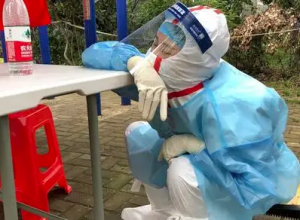
The Lancet report: WHO and most governments slow to respond to new crowns, millions of deaths could have been avoided
“This is a profound tragedy and a multi-layered global failure to fight the epidemic.” On September 14, The Lancet, a leading international medical journal, published a study on the New Crown epidemic that makes clear that the World Health Organization and most governments were too slow to respond to the New Crown epidemic, and that many failed policies led to millions of avoidable deaths.

The Lancet Commission on the New Coronas Outbreak, which authored the report, was established in July 2020 and includes 28 global experts from the fields of public policy, international cooperation, epidemiology, vaccinology, economics, and mental health, according to public sources. The commission also oversees the work of 12 thematic groups made up of 173 experts.
The report criticized the World Health Organization (WHO) for its performance in the early stages of the outbreak, saying the organization was “too cautious and slow” in warning about the ability of the virus to spread from person to person, classifying the outbreak as a “public health emergency of international concern” and supporting the public to wear masks, among other important issues. The report also noted that the majority of the world’s population has been “overly cautious and slow to act.
The report also notes that governments in most countries and regions of the world have been equally slow to recognize the importance of the epidemic and to respond to it. Despite the high degree of interdependence among countries, policy coordination among most governments to contain the outbreak was inadequate. “The result has been millions of avoidable deaths and set back the sustainable development process in many countries.”
In particular, the report mentions that until 2019, the United States and the United Kingdom were generally considered to have the strongest capacity to respond to the outbreak, with Western Pacific countries such as China scoring somewhat lower. However, in the aftermath of the new crown outbreak, the reality was the exact opposite of expectations, with these Western Pacific countries responding in a timely manner and generally implementing policies to contain the outbreak.
The Lancet New Crown Outbreak Commission noted that, according to the Institute for Health Metrics Evaluation (IHME) at the University of Washington, the global New Crown outbreak had reported more than 6.9 million deaths by the end of May this year. But given the large number of deaths not officially counted, the institute estimates the actual number of deaths could reach more than 17.2 million.
“This staggering number is a profound tragedy and a global failure on multiple levels.” The commission wrote in its report that “too many governments have failed to adhere to the basic principles of institutional rationality and transparency, too many people have failed to respect and oppose basic public health precautions, and too many countries have failed to cooperate to control the epidemic.”
In response to the current spread of the Omicron strain, The Lancet also notes that most countries have prematurely eliminated public health policies such as nucleic acid testing, wearing masks, and social distancing, which would impose high costs and extremely high infection rates that would disrupt education and work, place a considerable burden on health services and undermine economic recovery.
“Three major risks should be kept in mind at this stage. First, future variants could be highly infectious and lethal. Second, the currently unvaccinated population remains vulnerable to morbidity and mortality and provides opportunities for free transmission of the virus, increasing the risk of dangerous mutations. Finally, the Omicron outbreak demonstrates that even highly vaccinated populations can experience economic disruption, with outbreaks leading to staffing shortages in health and basic industries, school closures, disruptions in business operations, and impediments to the resumption of tourism and international travel.”
Based on reflections on the failure of most countries to fight the epidemic, The Lancet Commission on the New Crown Outbreak calls for a coordinated worldwide effort to end the New Crown outbreak on a rapid and equitable basis.
Among the report’s recommendations are that countries pursue vaccine strategies aimed at protecting populations on a sustainable basis; strengthen national health systems and develop plans to protect against outbreaks; pursue global strategies to strengthen research, development and production capacity in all WHO regions, including low-income areas; and reform WHO to strengthen its functions and significantly increase its budget.
In response to the Lancet report, WHO responded on September 15 that they agreed with the overall recommendations outlined by the Commission in the report, which are consistent with WHO’s commitment to strengthening outbreak preparedness, prevention and response capacity. However, WHO also claimed that the report contained several “key omissions and misunderstandings,” notably underestimating the speed and scope of WHO’s response to the new outbreak.

We are not there yet, but the end is in sight …… but marathon runners never stop when they see the finish line, they run as hard as they can, harder. Now is the time to run harder to make sure we cross the finish line and reap the rewards of our hard work.”
Regarding the upcoming fall and winter epidemic situation, WHO experts believe that a new wave of infections may also emerge in the future and urged countries to remain on high alert. Maria van Kerckhove, technical head of WHO’s health emergency program, said at a news conference on the 14th that the new coronavirus is still spreading at a high level around the world and that the actual number of confirmed cases is underestimated.
She predicted that a wave of infections caused by the Omicron subtype strain or even new mutant strains could occur in the future everywhere and at different points in time. But she also stressed that a new wave of infections does not necessarily mean more new deaths because people already have the tools to fight the epidemic, such as vaccines and antiviral drugs.
According to the Financial Times, Jeffery Sachs, chairman of The Lancet’s New Crowns Committee and a professor at Columbia University, also warned that it was time to “face the hard facts.
In his report, Sachs noted that the new crown epidemic has exposed the weaknesses of the UN-based multilateral system. He argued that these failures stemmed mainly from vaccine nationalism, the lack of flexibility in the intellectual property system and the political erosion of multilateral solutions.
“Our most basic recommendation is to strengthen multilateralism in all key areas – political, cultural, institutional and financial.” Sachs wrote, “We call on all countries, especially those that are the wealthiest and most powerful, to support, preserve and strengthen the work of the UN system.”


Average Rating